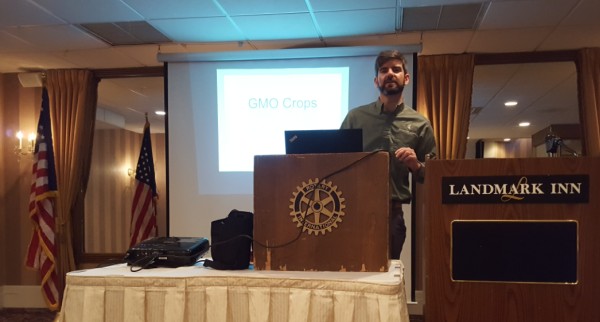Marquette, Michigan – April 24, 2019 – Marquette West Rotary welcomed James DeDecker, specialist and director of the MSU Upper Peninsula Research and Extension Center, to discuss the facts and myths of Genetically Modified Crops. He brought his perspective as an expert in sustainable agriculture, agricultural decision-making and integrated pest management to this often controversial topic.

Traditional plant breeding has been going on for 10,000 years, selecting desirable traits to cross-breed with other plants with desirable traits, planting the resulting seeds, and then repeating the process to accumulate positive traits with each new generation. Genetic modification means moving genes around in the same species or into another crop. “Examples and in food crops include resistance to certain pests, diseases, environmental conditions, reduction of spoilage, resistance to chemical treatments (e.g. resistance to a herbicide), or improving the nutrient profile of the crop.” — Wikipedia – Genetically Modified Crops
DeDecker focused his presentation on the science, business, and perception of transgenic crops:
- Is grass-fed beef better?
- Food labels on GMO verses non-GMO products
- Do GMO crops with herbicide resistance seeds reduce the need for spraying, therefore introducing fewer herbicides into the environment?
- How much transparency of food sources is there?
- How do organic production systems compare to non-organic systems?
Over the years, older techniques of modifying crops gave way to newer ways, with the scientific basis started with Gregor Mendel’s experiments with plant hybridization. In the last 150 years, the pace of improvements increased greatly as seed distribution was commercialized and further subject to scientific techniques to identify traits that could be passed on and those traits arising from environment. By the mid-twentieth century, while scientific techniques had quickly sped up the process of positive trait development, these techniques were slow and somewhat random. Example techniques include using cytoplasmic male sterility in the hybridization process or simply shooting genetic material into cells with the hope the seeds would incorporate the material into their DNA.

Today, with the role of DNA and RNA much better understood, virus or bacterial genes are sent into the cells to

directly modify genetic material. However, technology and these improved techniques come at a cost. To get a trait expressed takes a lot of effort.
The process is very expensive and takes several years to bring the results to market. According to a study by Phillips and McDougal “The cost of discovery, development and authorization of a new plant biotechnology trait introduced between 2008 and 2012 is US $136 million” and over 13 years.
Despite some fairly prevalent urban myths, only a limited number of plants are GMO crops, including apples, potatoes, field corn, soy beans, sweetcorn, papaya, and summer squash. Most GMOs are focused on pest and herbicide resistance, such as inserting genes to help crops resist disease and to avoid using excess fungicides.
The United States is the leader in genetically modified crops. Our crops are now using less fresh water but still thrive. Additional efforts including making crops even more tolerant to droughts. This is important as the climate changes.

Other goals being pursued using genetically modified crops:
- Improved drought tolerance
- Increased vitamin A in rice
- Increased shelf-life
- Reduced food waste by reducing bruising and browning, such as efforts with the arctic apple: looks better, more stable, and less waste
- Reduce or eliminate pesticide use

Risks and Concerns with GMO Crops
- Cross-pollination of traditional hybrid seeds with GMO seeds. Hybrid seeds increased yields in the 1880’s when introduced, but GMO seeds haven’t had nearly the same history of increased yields. However, with more GMO plants surviving pests, fewer pesticides are needed and less is sprayed.
- Technological improvements often lead to more technological improvements. Similar to a treadmill farmers are forced to adopt and adapt quickly to the new technology, where there are few options since GMO Crops are mostly developed and distributed through just three huge corporations. If farmers don’t keep up, they may not survive in such an accelerated market.
- Is current regulation of these genetic engineering experiments sufficient. A fear of under-regulation is common, but according to the Library of Congress: “Plant GMOs are regulated by the US Department of Agriculture’s Animal and Plant Health Inspection Service under the Plant Protection Act. GMOs in food, drugs, and biological products are regulated by the Food and Drug Administration under the Federal Food, Drug, and Cosmetic Act and the Public Health Service Act. GMO pesticides and microorganisms are regulated by the Environmental Protection Agency pursuant to the Federal Insecticide, Fungicide and Rodenticide Act and the Toxic Substances Control Act. The form of regulation varies depending on the type of GMO involved.”
- Public perception regarding GMOs is often both negative and based less on science than on fear or ignorance.
- Long-term affects of GMOs on human health may be more adverse than currently understood.

Questions to consider for the future:
- Do we need GMO’s?
- Who benefits from use?
- How are we informed? What is the source of our information?
- When we see non-GMO labels on products like maple syrup, is it relevant?
- What are all the long-term potential consequences?

